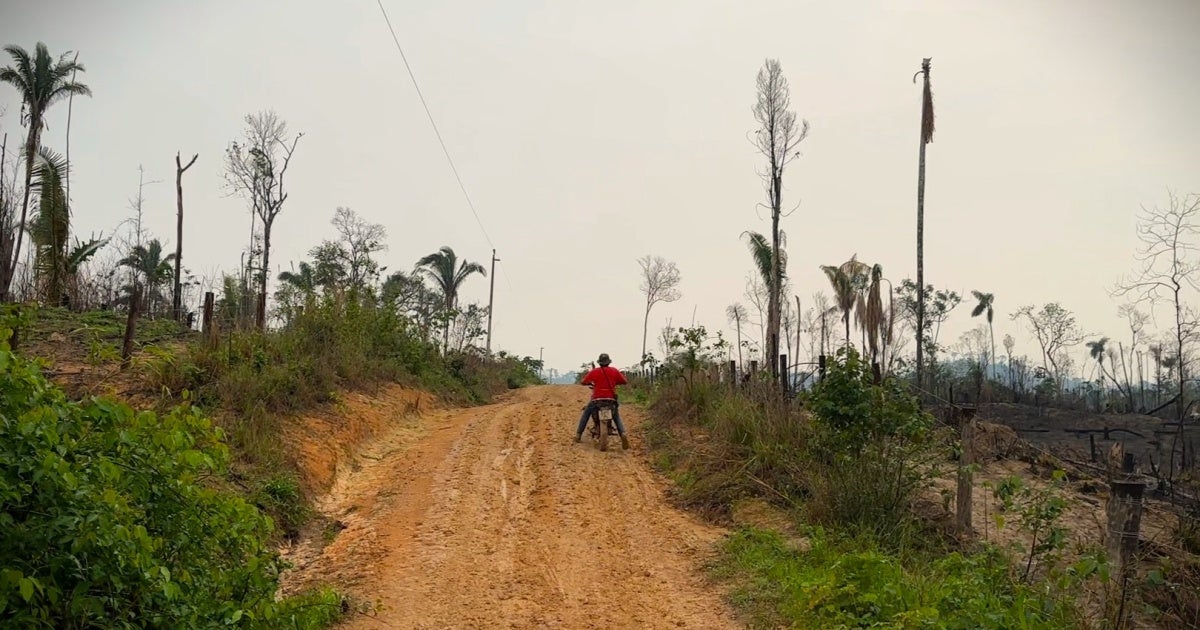- Illegal cattle ranching has devastated territories of small land holders and Indigenous peoples in the Amazon region that will hold the COP30 climate summit this year.
- The world’s largest meat company, JBS, has no system to track indirect suppliers of cattle, despite longstanding pledges to create one, and may have sourced illegal cattle from the affected territories.
- The Brazilian government needs to remove the illegal cattle ranches from this region, and JBS should meet its pledges and remediate abuses it may have contributed to, even if unintentionally.
(São Paulo, October 15, 2025) – Illegal cattle ranching has devastated the territories of small farmers and Indigenous peoples in Pará, the state that will hold the COP30 climate summit this year, Human Rights Watch said in a report released today. JBS, the world’s largest meat company, may have exported beef and hides to the European Union made with cattle sourced from illegal ranches in this region.
The 86-page report “Tainted: JBS and the EU’s Exposure to Human Rights Violations and Illegal Deforestation in Pará, Brazil,” details how cattle ranchers illegally seized land and devastated the livelihoods of lawful residents in the Terra Nossa smallholder settlement and the Cachoeira Seca Indigenous territory, affecting their rights to housing, land, and culture. Human Rights Watch analysis of official sources shows that illegal farms in these areas sold cattle to several JBS direct suppliers.
“JBS still does not have a system to track its indirect suppliers of cattle, despite pledging it would implement one as early as 2011,” said Luciana Téllez Chávez, senior environment researcher at Human Rights Watch. “Without it, the company cannot meet its commitment to eliminate deforestation from its supply chain by the end of the 2025.”
Through the analysis of cattle transport permits issued by the Pará state government, Human Rights Watch identified five cases in which illegal ranches in Terra Nossa and Cachoeira Seca supplied cattle to ranches outside these protected areas, and subsequently those ranches sold cattle to JBS slaughterhouses. The cattle ranches investigated in these territories are illegal under Brazilian federal law.
Brazil’s land reform agency created the rural settlement Terra Nossa for small farmers in 2006. Families were to farm the land, harvest fruits and nuts from the rainforest – which initially constituted 80 percent of the 150,000-hectare settlement – and sell their produce in local markets.
Ranchers have, however, illegally encroached on Terra Nossa. They have violently retaliated against people who opposed them. By 2023, 45.3 percent of the settlement had been converted into pasture.
Beginning in 2016, the land reform agency surveyed the settlement, ultimately finding 78.5 percent illegally occupied. Yet for years failed to take action to remove illegal ranches. The agency is considering a plan to split up the settlement and revise its status, which would most likely perpetuate impunity for environmental criminals.
In Cachoeira Seca, the Arara Indigenous people depend on the rainforest in their 733,000-hectare territory. The federal government is legally required to remove non-Indigenous occupants. Instead, ranchers have established more illegal cattle ranches, thus reducing the availability of game and forest products, restricting Indigenous peoples’ movement in their own territory, and undermining their cultural rights. Cachoeira Seca registered the largest deforested area in an Indigenous territory in the Brazilian Amazon in 2024.
JBS does not systematically track its indirect suppliers and cannot guarantee that tainted cattle did not enter its supply chain, Human Rights Watch said. There is no federal requirement to track individual cattle as they move through various farms in Brazil.
In correspondence with Human Rights Watch, JBS maintained that they monitor the farms of its direct suppliers to see that they comply with its procurement policy. The company also stated that, as of January 1, 2026, it will be mandatory for direct suppliers to provide information on their suppliers.
The Pará government announced it will establish an individual cattle traceability system by 2026, and officials told Human Rights Watch they will generally stop issuing permits for cattle movements into protected forests. The federal government announced a plan to implement a national individual cattle traceability system by 2032. Given the cross-border dynamic of the illegal cattle trade, a slow implementation of the federal system is likely to sabotage progress, Human Rights Watch said.
EU countries are scheduled to enforce the Deforestation-Free Products Regulation as of January 2026. The law would prohibit placing cattle products on the EU market if they originated from land that was deforested after 2020, or if production violated domestic laws in the country of origin. EU lawmakers are discussing delaying enforcement by one year. A delay would allow tainted commodities to continue flowing into the single market and call into question EU commitment to tackling its global deforestation footprint, Human Rights Watch said.
Human Rights Watch analyzed trade data between 2020 and 2025, finding Belgium, Denmark, France, Germany, Ireland, Netherlands, Spain, and Sweden imported beef from the municipalities that host the JBS facilities identified in this report, while Italy was a major destination for leather products.
The Brazilian government should remove illegal ranches and seek damages against those responsible for unlawful occupation and use of land in the affected communities. The federal government should also accelerate the implementation and effective enforcement of a cattle traceability system.
JBS should take steps to remediate any land fraud, illegal deforestation, or human rights abuses that the company may have contributed to – even if unintentionally – in Terra Nossa and Cachoeira Seca.
“Tackling deforestation and human rights abuses embedded in cattle supply chains is a shared responsibility between sellers and buyers,” said Téllez Chávez. “Brazil and the EU should work together to protect the rainforest and uphold the rights of communities that depend on it.”



